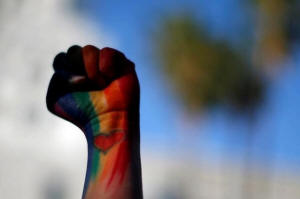|
Gay American Muslims struggle with
identity after Orlando massacre
 Send a link to a friend
Send a link to a friend
 [June 16, 2016]
By Gina Cherelus [June 16, 2016]
By Gina Cherelus
NEW YORK (Reuters) - Qais Munhazim woke up
on Sunday to reports that an Afghan-American gunman had rampaged through
a gay nightclub in Orlando, Florida, in an attack apparently motivated
by support for militant Islamist groups.
Tearful and disconsolate, Munhazim, a gay Muslim man who is
originally from Afghanistan, made plans to attend the University of
Minnesota's vigil the following day for the victims.
The Orlando shooter killed 49 people and injured 53: the deadliest
mass shooting in modern U.S. history and also the worst attack in
America on the lesbian, gay, bisexual and transgender (LGBT)
community.
"The moment I introduced myself to someone who is also part of the
(LGBT) community, she asked me what my nationality is and I said I
am Afghan," said Munhazim, a doctoral political science student at
the university, on Tuesday.
"Immediately her answer was, 'this is not the right time or place
for you.' I went there trying to be among my own community, to
grieve together with them. Even my grieving was questioned because
of my identity."
Munhazim's experience illustrates the isolation some Muslims in the
LGBT community in the United States are feeling.
 "Coming (to America) I found that freedom but at the same time I
definitely always found myself marginalized and discriminated
because of my faith, because Islamophobia has been propagated by a
lot of politicians in the U.S.," Munhazim said.
This referred to remarks by some politicians, most prominently
Republican presidential candidate Donald Trump, following the
Orlando shootings and previous such attacks, that have cast a shadow
of suspicion on Muslims in America.
While Islam has a wide variety of laws and customs across the
world's more than 1.6 billion Muslims, gay sex is illegal in many
Muslim-majority countries. In some countries such as Iran,
Afghanistan and Saudi Arabia, homosexual acts can be punishable by
death.
According to Hussain Turk, a Pakistani-American Muslim lawyer from
Los Angeles, what makes it difficult for Muslims to be both gay and
religious is the idea that Islam is a monolithic faith with a single
set of rules stemming from the Koran, the religion's holy book.
But he argues, "What Iíve learned is that Islam is a dynamic
religion at its core. Islam wasnít meant to be this anti-progressive
monolith."
Nonetheless, Turk, a gay Muslim man who also served as
editor-in-chief of the University of California, Los Angeles'
Journal of Islamic and Near Eastern Law, said there are Muslims, gay
and non-gay, who say Islam's resistance to change is what gives it
its appeal as a religion.
There are about 3.3 million Muslims of all ages living in America,
according to a Pew Research Center study in 2015. There are no
statistics on how many LGBT Muslims are in the country.
Mona Siam, a Jordanian Muslim woman who is also lesbian, was granted
asylum in the United States in 2011 after she said she was hit by a
stray bullet fired by police who were attempting to scare off guests
at a gay-friendly bar in Beirut, Lebanon.
[to top of second column] |

Dominique Hernandez holds up her fist painted in the colors of a
rainbow, with a heart on her pulse, attends a vigil in memory of
victims one day after a mass shooting at the Pulse gay night club in
Orlando, in Los Angeles, California, U.S. June 13, 2016.
REUTERS/Lucy Nicholson

Despite coming to the United States, Siam said that she still feels
some animosity from Americans because of her religion and her sexual
orientation.
"I feel conflicted in the U.S. because I came here for safety and I
feel like every part of my identity is being attacked," Siam said on
Tuesday.
"We are afraid of being Muslim in public or queer in public in a
country where that shouldnít be happening. Itís open-minded; you
have thousand of cultures and identities. Itís America."
Seeking to help Americans conflicted about their religion and
sexuality, the Muslim Alliance for Sexual and Gender Diversity has
hosted the Retreat for LGBTQ Muslims and Partners annually since
2011, attracting nearly 100 guests for a weekend of spiritual
building.
Tynan Power, a representative for MASGD, said that gender identity
and diverse sexual orientation have had substantial support in both
the Sunni and Shi'ite branches of Islam.
"There are Muslims who believe that the Koran forbids homosexuality,
just as there are Christians who believe the Bible does," said
Power.
"There are also Muslims who believe that honoring their God-given
capacity to love is a form of worship. Ultimately, no one
perspective can define a religion for all other people of that
faith."
Garrett Fugate, a Greek Muslim man who identifies as queer - a
multi-faceted word that describes Fugate as someone who dates people
of various sexual orientations - said that the MASGD Retreat allowed
him to find his home as a Muslim.

"When I was coming out I went from being very accepted to being very
ostracized from the Muslim community," said Fugate, a graduate
student at Boston University in Boston. "When I think of community I
think of that retreat."
(Story refiles to correct typographical "and" to "a" in last
paragraph.)
(Reporting by Gina Cherelus; Editing by Frances Kerry)
[© 2016 Thomson Reuters. All rights
reserved.]
Copyright 2016 Reuters. All rights reserved. This material may not be published,
broadcast, rewritten or redistributed. |